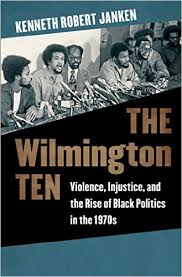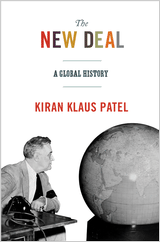Starting this month, I’ll be doing a brief rundown of upcoming books in intellectual history coming out for the following month. I began this post with the intention of writing about some of the most interesting works in intellectual history coming out this year, but after taking stock of how many wonderful books are coming out this month, decided to limit my post to just a few notable works coming out this month. Please add any books you know of coming out this month in the comments section—and, by all means, feel free to include fiction as well.
As this year will mark the fiftieth anniversary of the start of the Black Power movement, it’s fitting that a book on the Wilmington Ten case is being released this week. Kenneth Robert Janken’s The Wilmington Ten: Violence, Injustice, and the Rise of Black Politics in the 1970s offers a look at the struggle over desegregation in Wilmington, North Carolina. This was a landmark moment in the Black Power era, and an incident that was a reminder of the tenuousness of the gains of the Civil Rights Movement. Already, I cannot  help but to compare this book to Devin Fergus’ Liberalism, Black Power, and the Making of American Politics, 1965-1980. Both showcase the importance of North Carolina, a “purple” state in the South that has both conservative and liberal traditions, to larger narratives of the African American freedom struggle.
help but to compare this book to Devin Fergus’ Liberalism, Black Power, and the Making of American Politics, 1965-1980. Both showcase the importance of North Carolina, a “purple” state in the South that has both conservative and liberal traditions, to larger narratives of the African American freedom struggle.
Lester Spence’s Knocking the Hustle: Against the Neoliberal Turn in Black Politics (which, in fact, came out in December 2015) offers a recent history of African American life. Spence situates African American culture—especially the idea of “hustling” that is prevalent in hip hop—within a larger neoliberal framework
. His earlier writings on hip hop and African American history, most notably the book Stare in the Darkness: The Limits of Hip Hop and Black Politics, indicate that Spence’s new work should be of interest to scholars interested not just in the African American experience, but in the relationship between economics, race, and political economy since the 1980s. I would add that Clarence Lang’s Black America in the Shadow of the Sixties would offer a good companion read—both works deal with African Americans, neoliberalism, and recent history, but using different analytical frameworks (Spence looking at African American culture, Lang looking at African American memory of the 1960s and the 1980s.)
Meanwhile, two other works highlight the continued importance of the New Deal to modern life. The New Deal: A Global History,
by Kiran Klaus Patel, offers a fresh, international perspective on the New Deal. I am looking forward to this book after reading Ira Katznelson’s Fear Itself, which briefly situated the New Deal and its politics in an international context. Patel’s work promises to do that and more—it is a fascinating 
addition in Princeton University Press’s “America in the World” series, showcasing some of the best in the transnational turn in American history.
Finally, Jefferson Cowie (best known for Staying Alive, his magisterial history of 1970s America), returns with The Great Exception: The New Deal and the Limits of American Politics. Also from Princeton University Press, Cowie’s book picks up where his article co-written with Nick Salvatore, “The Long Exception: Rethinking the Place of the New Deal in American History” left off. The Great Exception
promises to be another book in a growing list of monographs that re-evaluates the history of American liberalism from the 1930s until the present.
As you can see we’re in for a busy month of wonderful books in American intellectual history. As we revamp our book review list, and also make sure books from 2015 are also being sent out to reviewers at a timely pace, we look forward to spending 2016 talking about good books and important ideas that inform our present moment.

7 Thoughts on this Post
S-USIH Comment Policy
We ask that those who participate in the discussions generated in the Comments section do so with the same decorum as they would in any other academic setting or context. Since the USIH bloggers write under our real names, we would prefer that our commenters also identify themselves by their real name. As our primary goal is to stimulate and engage in fruitful and productive discussion, ad hominem attacks (personal or professional), unnecessary insults, and/or mean-spiritedness have no place in the USIH Blog’s Comments section. Therefore, we reserve the right to remove any comments that contain any of the above and/or are not intended to further the discussion of the topic of the post. We welcome suggestions for corrections to any of our posts. As the official blog of the Society of US Intellectual History, we hope to foster a diverse community of scholars and readers who engage with one another in discussions of US intellectual history, broadly understood.
This is such a great idea, Robert! Thank you for collecting these, and the way you present potential conversation partners for these new titles is so useful.
It appears that January is also a banner month for the intellectual history of capitalism. S. M. Amadae builds on her monograph Rationalizing Capitalist Democracy with Prisoners of Reason: Game Theory and Neoliberal Political Economy. Christian Christiansen’s Progressive Business: An Intellectual History of the Role of Business in American Society looks at attempts to reform capitalism from within. And the distinguished German historian Jürgen Kocka has Capitalism: A Short History coming out in the middle of the month.
Also, I would wager that some people who read this blog will enjoy reading and debating Stephen Prothero’s Why Liberals Win the Culture Wars (Even When They Lose the Elections).
Oh wow, thanks for these–I honestly hadn’t even heard about some of these. But you’re right. It does look like a banner month in history of capitalism works!
And it also seems we shall never get enough of the culture wars, heh.
Thanks Robert—and Andy too! – TL
Thanks for rounding up new releases, Robert! Here are some early-ish American dispatches I’m looking forward to reading:
Mary McAleer Balkun and Susan C. Imbarrato, eds., Women’s Narratives of the Early Americas and the Formation of Empire
Corey M. Brooks, “Liberty Power: Antislavery Third Parties and the Transformation of American Politics”
Jonathan Eacott, “Selling Empire: India in the Making of Britain and America, 1600-1830”
Vanessa Schulman, “Work Sights: The Visual Culture of Industry in Nineteenth-Century America”
And peeking into Feb., maybe even into the 20th century (!), I’d like to check out Cheryl Knott’s “Free, Not for All: Public Libraries in the Age of Jim Crow”
At the risk of redundancy, thank you for the post and comments.
Thanks Robert! I added two of the titles to my bibliography on “The Great Depression and the New Deal,” and a couple more to my forthcoming compilation, “The Black Struggle for Civil Rights, Freedom, & Equality in the U.S.”
Thanks for all these folks–I apologize for my tardiness in responding, but all the suggestions are greatly appreciated!